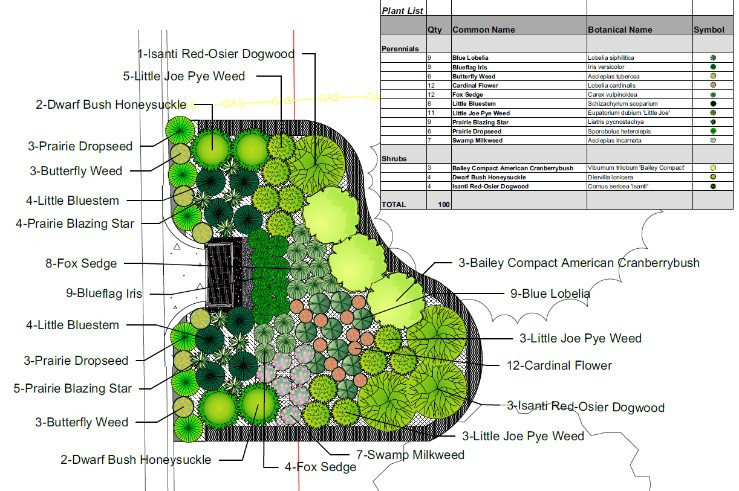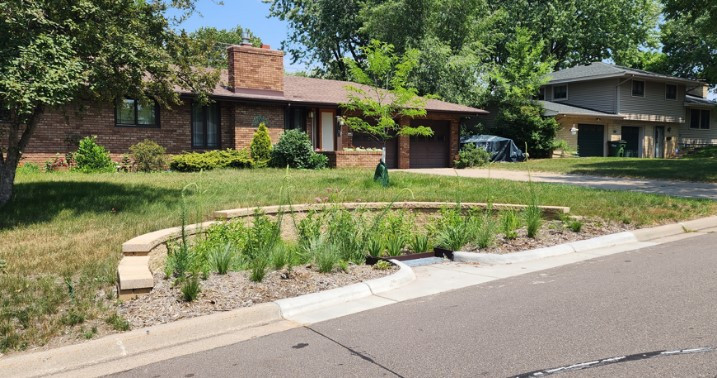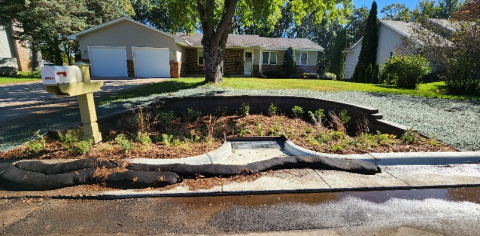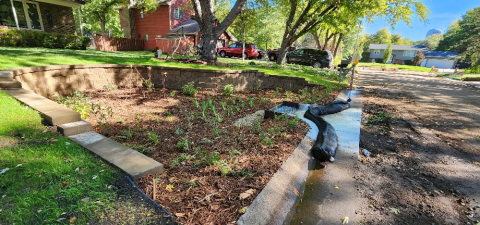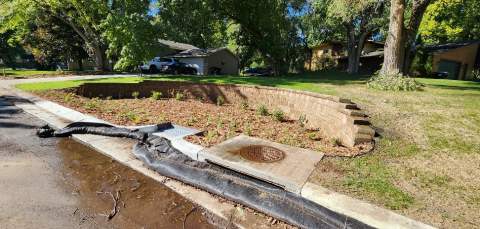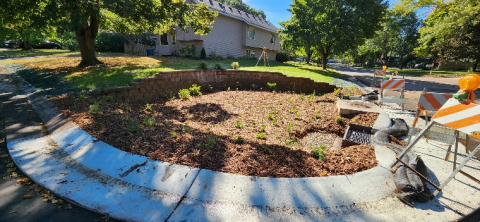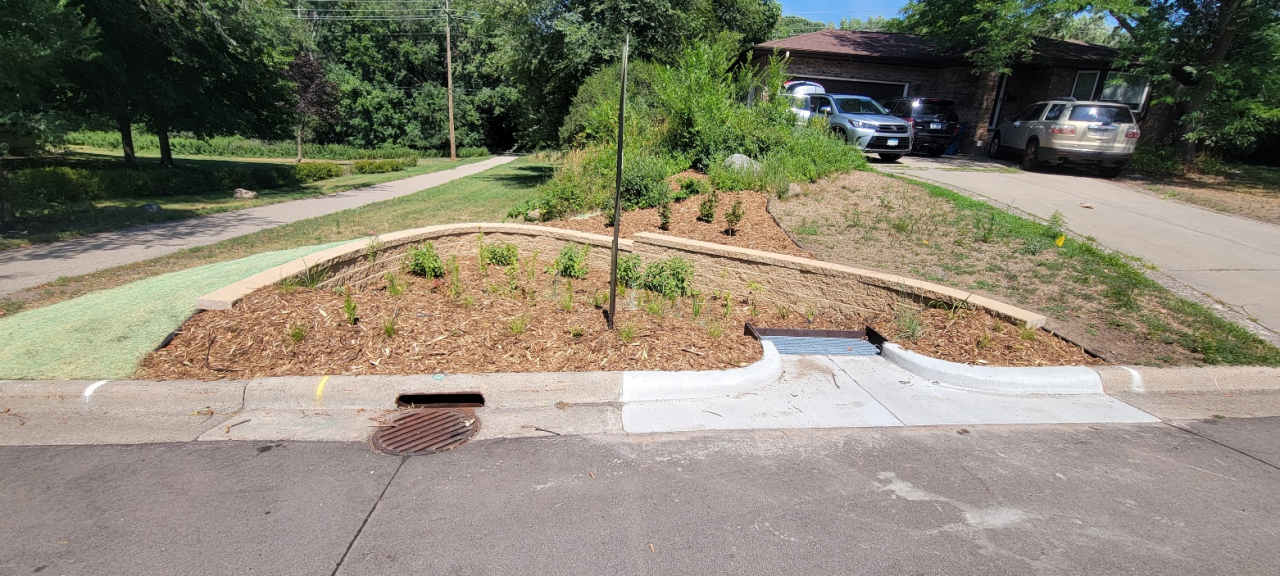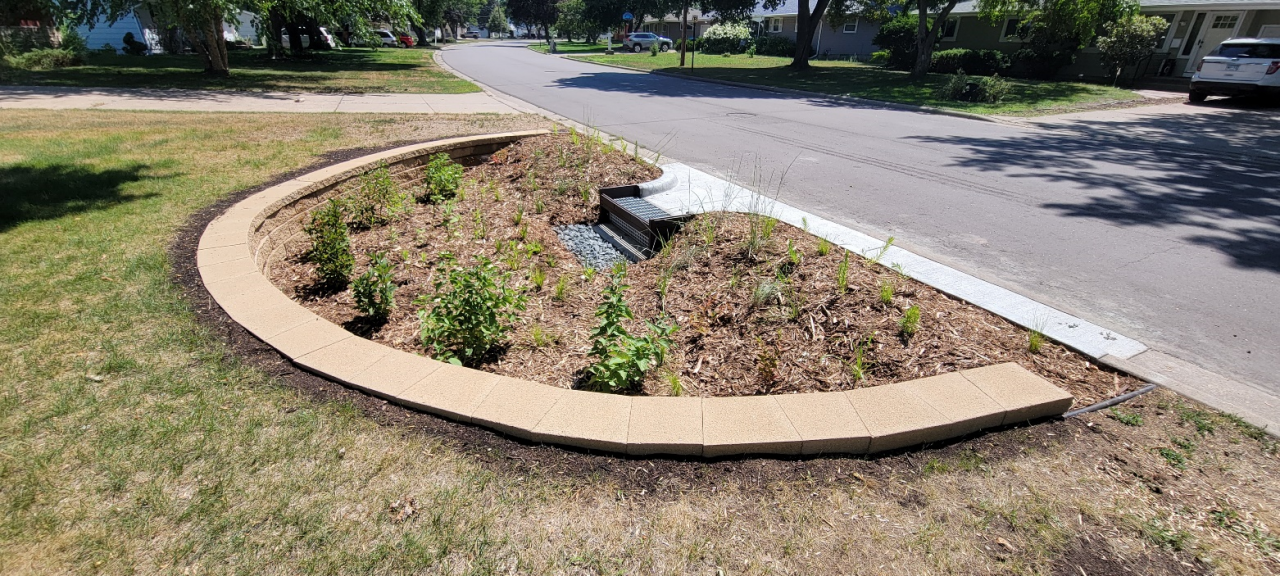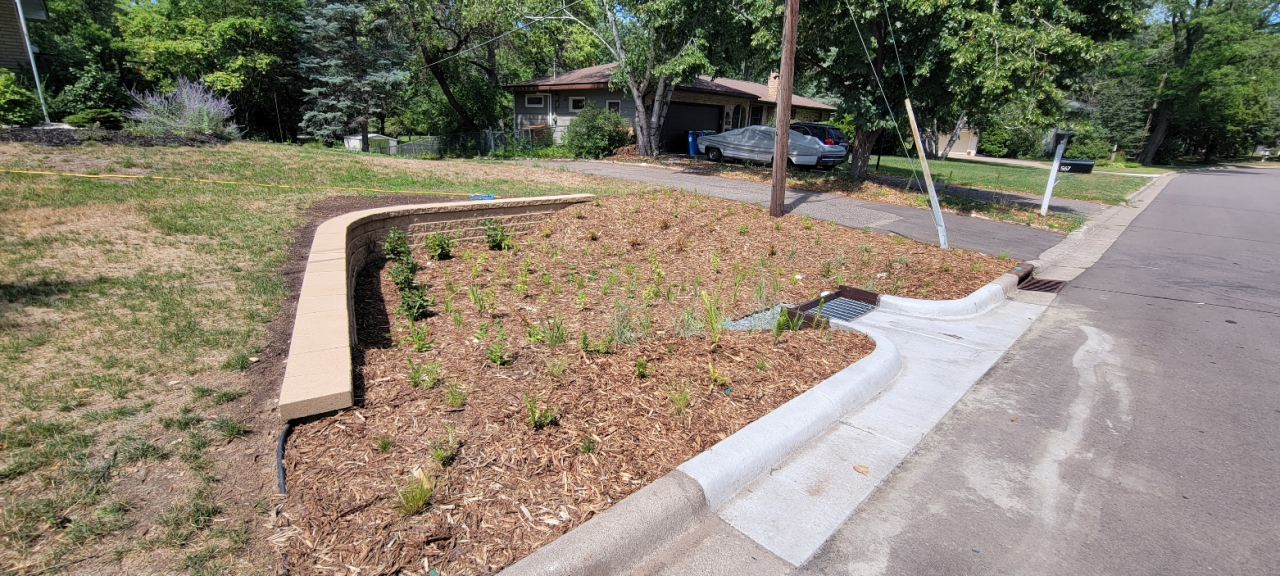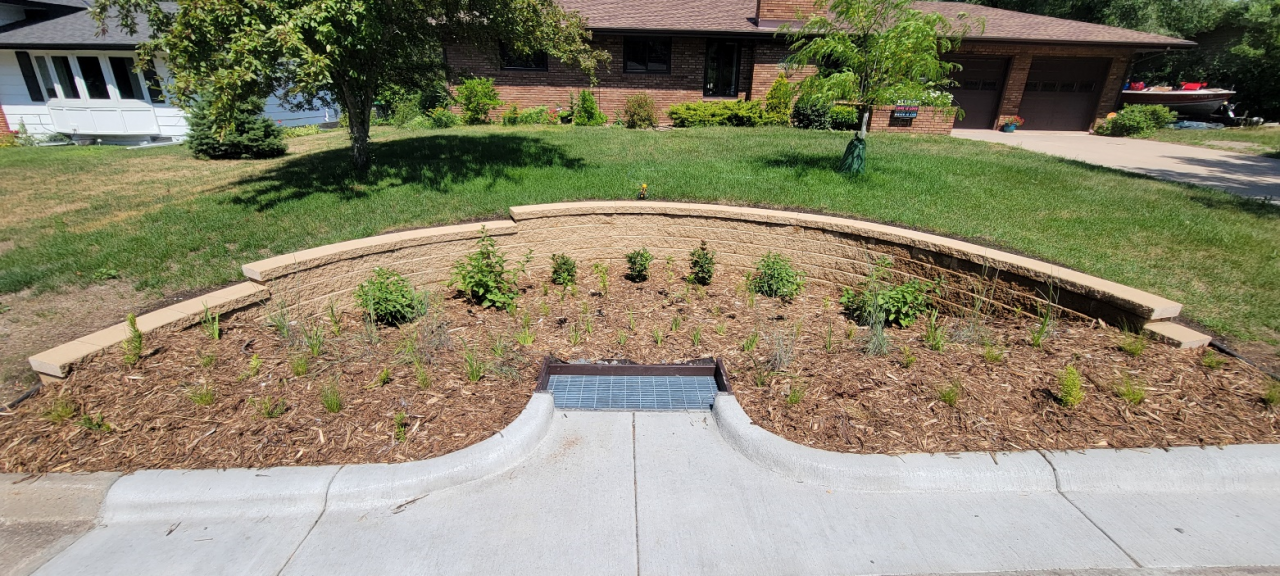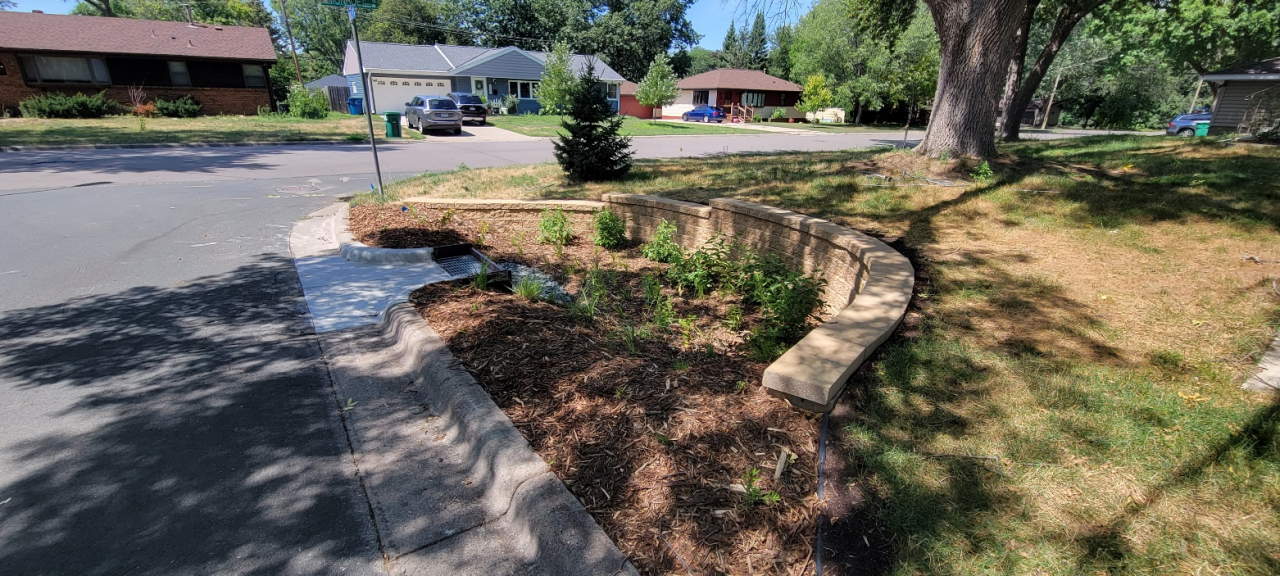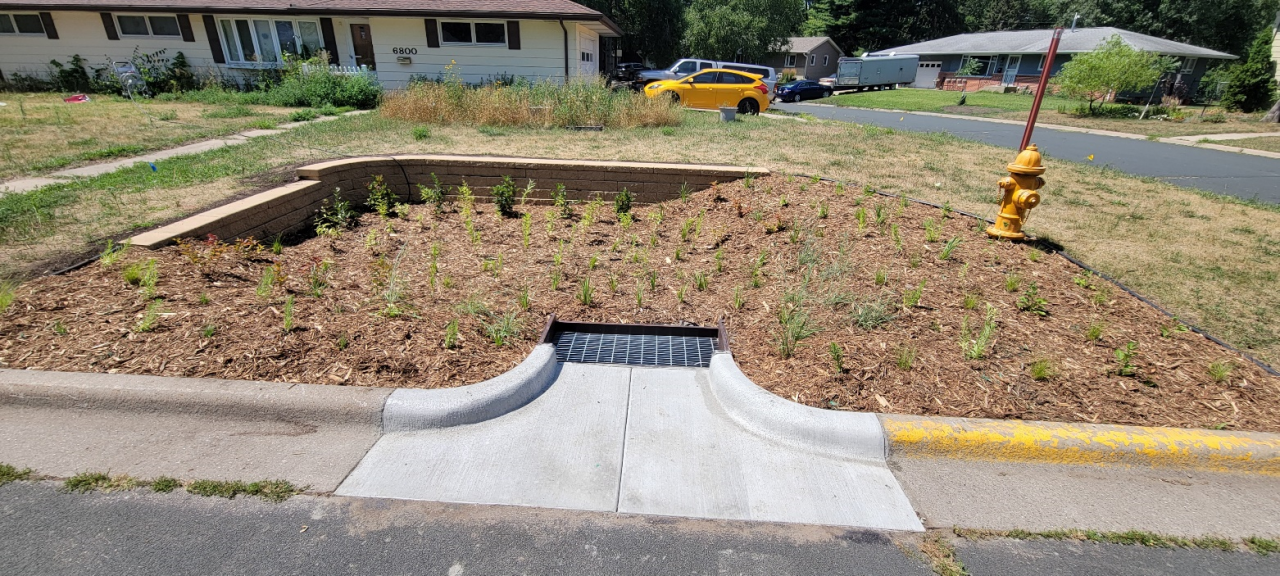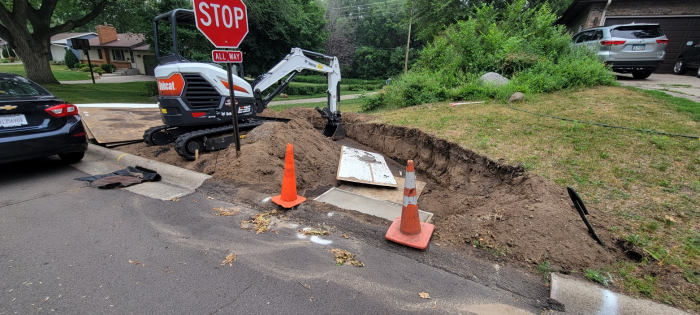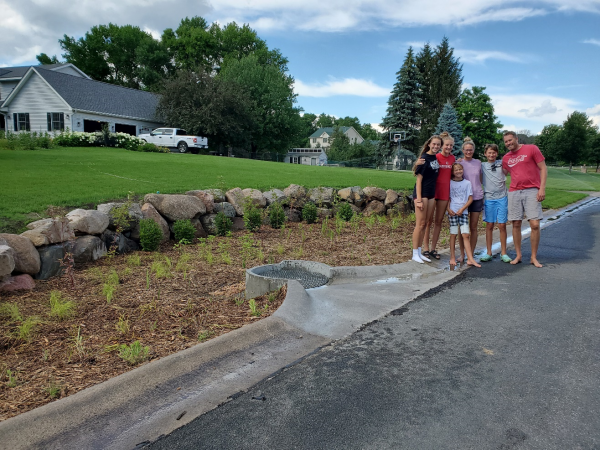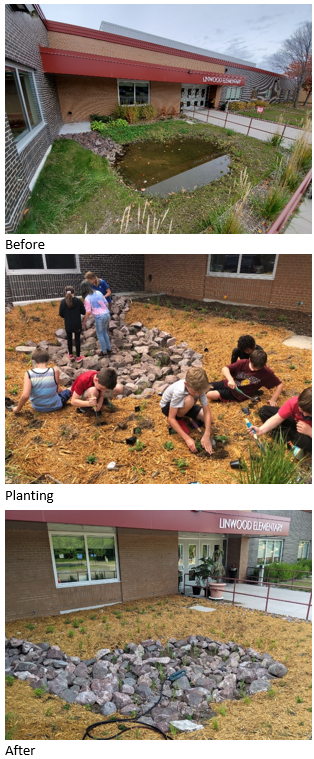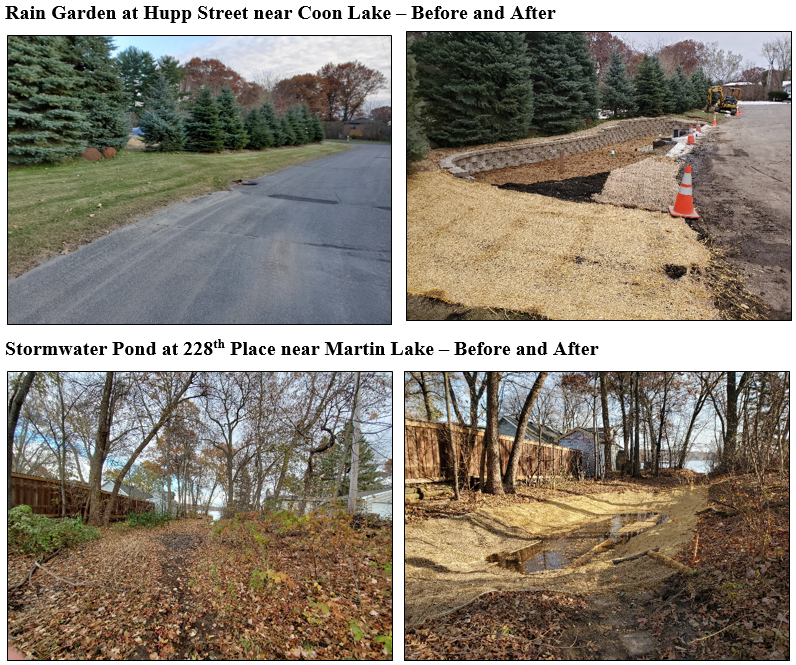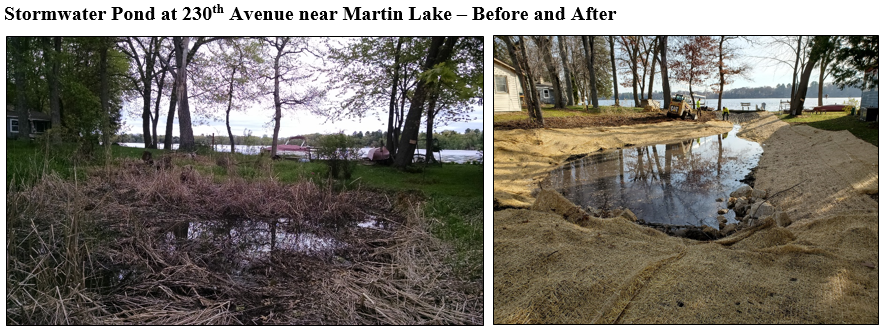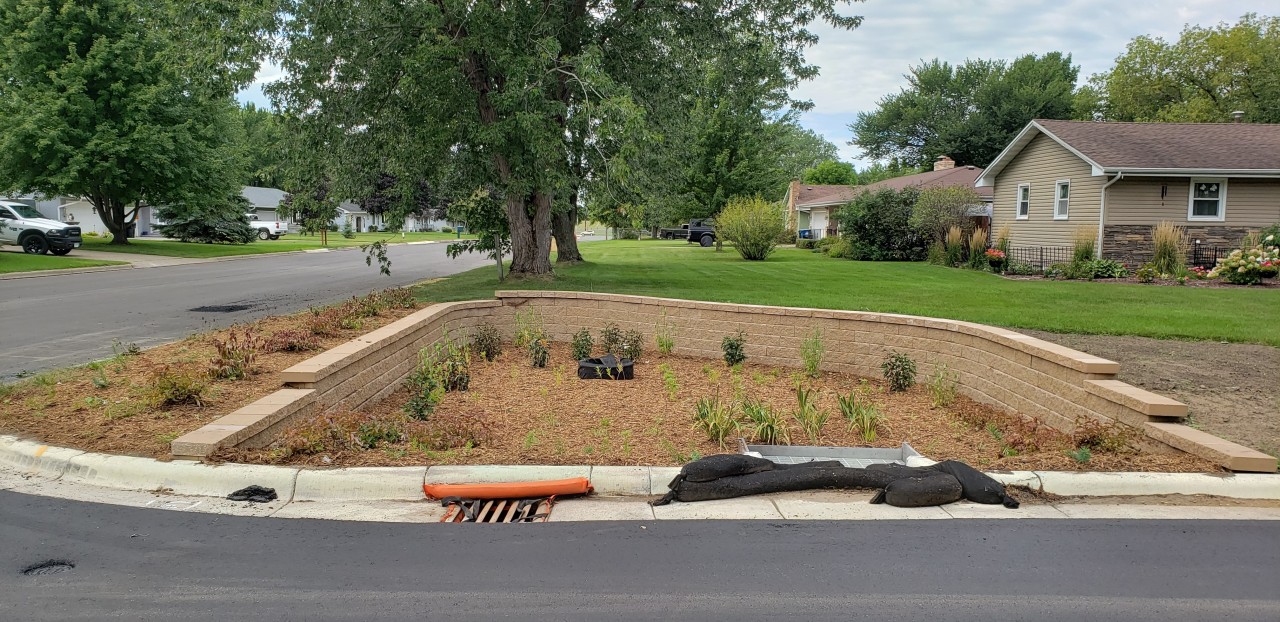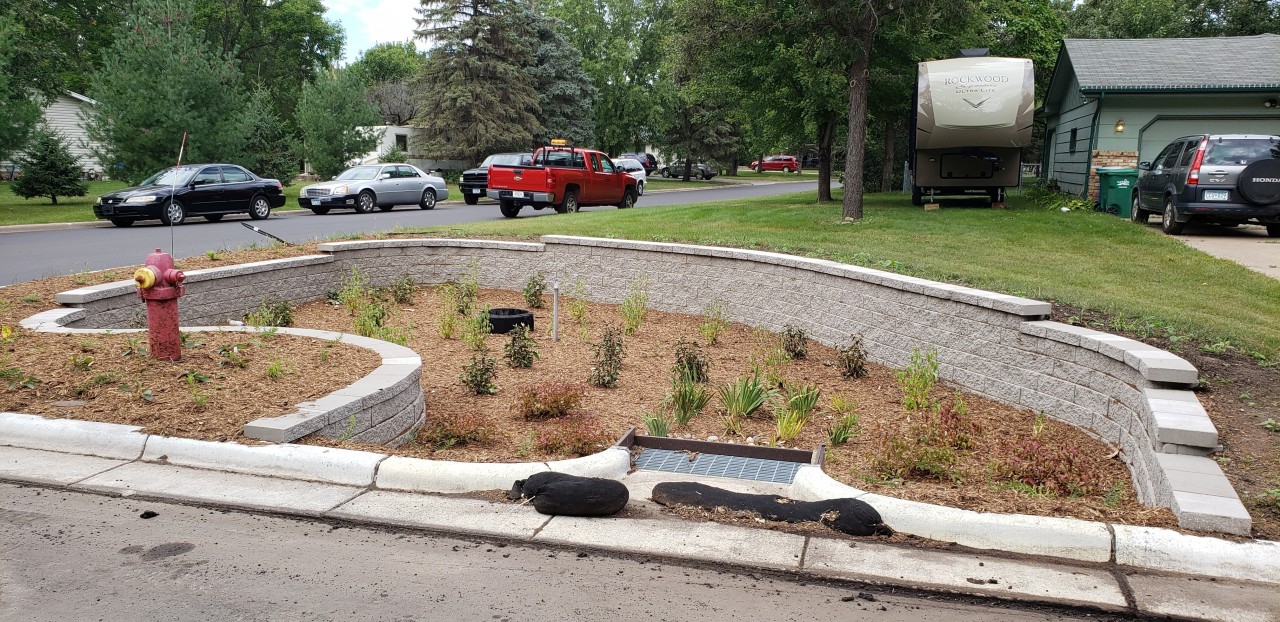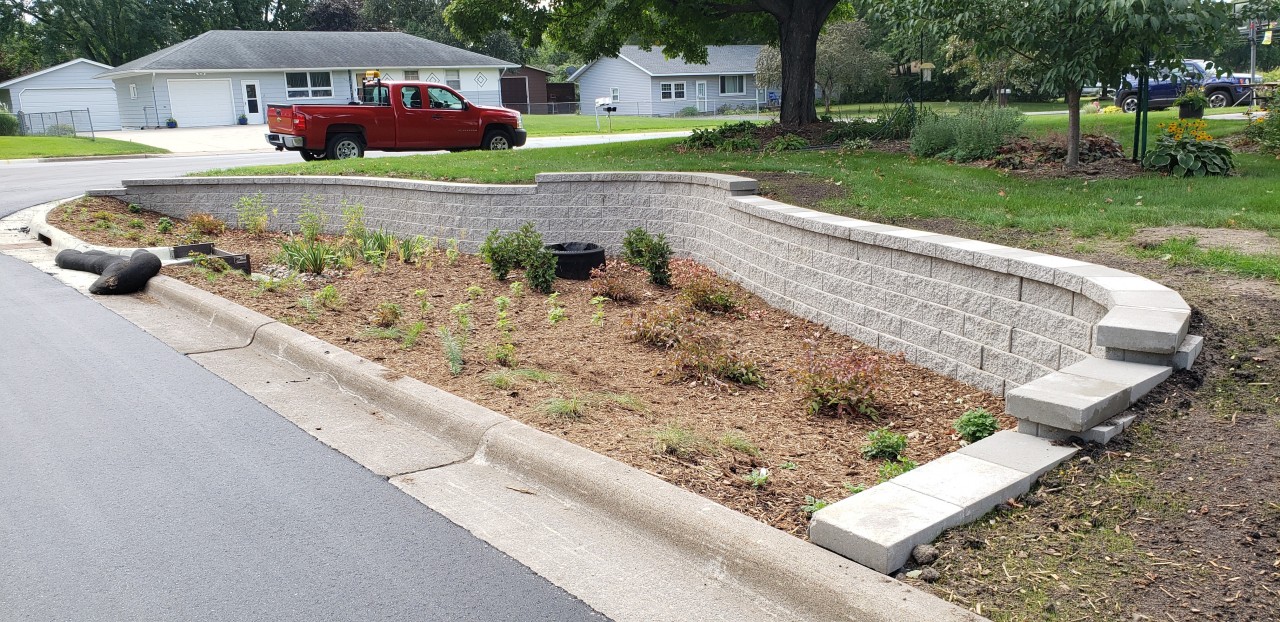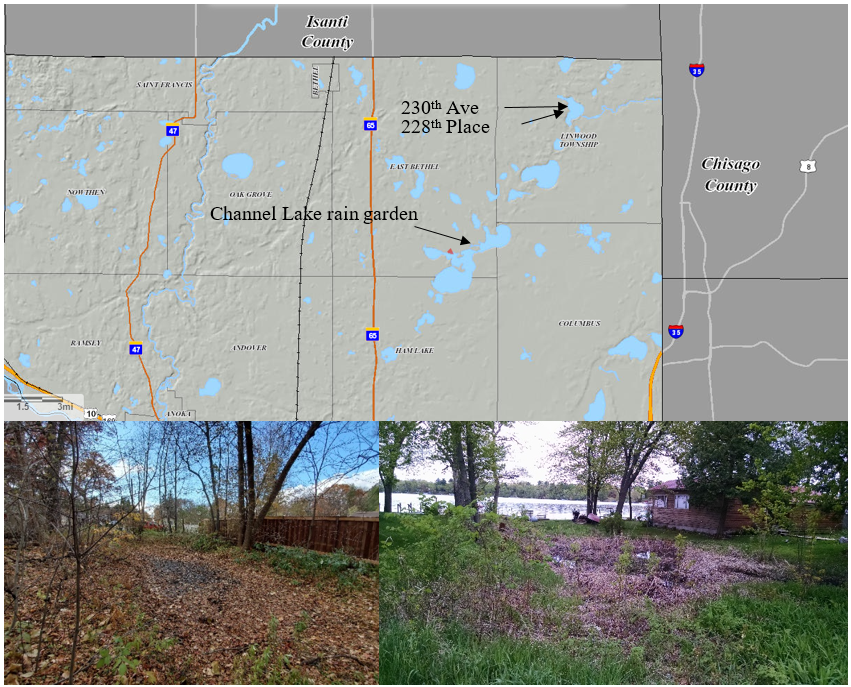This ACD video showcases a successfully completed rain garden that was built on a city outlot in St. Francis, MN. This rain garden was funded through the Clean Water, Land, and Legacy Amendment, with additional funds from the Upper Rum River Watershed Management Organization. The City of St. Francis will provide project maintenance. This video combines real footage, motion graphics, and 3D animation to showcase the entire construction process and illustrate the process of building a rain garden with an underdrain system. The underdrain system is largely hidden underground, so this video is intended to help inform on what a underdrain system may look like. For more information contact Brian Clark, Natural Resource Technician, at
Stormwater runoff from Fridley's Channel Rd. NE neighborhood currently flows to and through the storm sewer network directly to Rice Creek, untreated. This is a common occurrence in well-established neighborhoods built prior to stormwater treatment regulations. However, thanks to collaboration between the City of Fridley, Rice Creek Watershed District (RCWD), ACD, and private landowners, this neighborhood with soon be retrofitted with four curb-cut rain gardens designed to reduce water volume and pollutants entering Rice Creek.
These gardens have been strategically located throughout the neighborhood in order to capture as much runoff as possible. The benefits of infiltrating this stormwater will amount to an estimated reduction of 56,192 cubic feet of water, 3.57 lbs of phosphorus, and 677 lbs of total suspended solids to Rice Creek per year. Each garden will also be densely planted with native forbs, grasses, and shrubs to provide improved water infiltration and pockets of high-quality habitat in a highly developed landscape.
Funding is provided by the RCWD's water quality cost share program and the City of Fridley. Landowners at each garden site have voluntarily enrolled in this opportunity and have agreed to maintain these gardens to ensure long-term functionality. For more information contact Breanna Keith, Water Resource Specialist, at
Four rain gardens were installed in a northern Anoka neighborhood as part of the City's 2022 Street Surface Improvement Project. Collectively, these gardens will capture nearly 10 acres' worth of stormwater runoff (over 700,000 gallons annually) which would otherwise drain untreated to the Rum River. Through this, sediment loading to the river will be reduced by 969 pounds/year, and total phosphorus loading will be reduced by 3 pounds/year.
Each garden provides additional ecological benefits through the planting of a diverse range of native species, creating several hundred square feet of rich pollinator habitat within the Rum River corridor. Species planted included butterfly weed, cardinal flower, swamp milkweed, red-osier dogwood, dwarf bush honeysuckle, and several others.
| Funding for project design was provided by the Metropolitan Conservation Districts Engineering and Technical Assistance Program, and funding for construction was provided by the City of Anoka and State Watershed-based Implementation Funding. |
Construction is complete for six rain gardens at residential lots in the Rice Creek Terrace neighborhood in the City of Fridley. These rain gardens were placed at high priority locations to intercept and treat stormwater before it enters Rice Creek. The locations were identified during a Lower Rice Creek Stormwater Retrofit Analysis conducted by ACD in partnership with the City and the Rice Creek Watershed District. The rain gardens were funded by the RCWD's water quality cost share program and the City of Fridley. Landowners have all agreed to long-term maintenance of the gardens to ensure optimal and continuing stormwater treatment.
Cumulatively, the six rain gardens are estimated to infiltrate 455,000 gallons of water, as well as remove 605 pounds of sediment and two pounds of phosphorus loading to Rice Creek annually. All six rain gardens are vegetated with native plants to maximize infiltration and provide the co-benefit of pollinator habitat. Additionally, one rain garden is located immediately adjacent to a trail entrance into Locke County Park, providing an excellent public education opportunity.
Over the next two to three years, the native plant plugs will get much bigger, filling the gardens with color and life. To see other rain gardens already installed throughout Anoka County, please see the virtual project tour on ACD's website. See photos of all six new rain gardens above.
Six rain gardens are being installed at residential lots in the Rice Creek Terrace neighborhood in the City of Fridley. These rain gardens are being placed at high priority locations to intercept and treat stormwater before it enters Rice Creek. The locations were identified during a Lower Rice Creek Stormwater Retrofit Analysis conducted by ACD in partnership with the City and the Rice Creek Watershed District. The rain gardens are being funded by the RCWD's water quality cost share program and the City of Fridley. Landowners have all agreed to long-term maintenance of the gardens to ensure optimal and continuing stormwater treatment.
Cumulatively, the six rain gardens are estimated to infiltrate 455,000 gallons of water, as well as remove 605 pounds of sediment and two pounds of phosphorus loading to Rice Creek annually. All six rain gardens will be vegetated with native plants to maximize infiltration and provide the co-benefit of pollinator habitat. Additionally, one rain garden will be located immediately adjacent to a trail entrance into Locke County Park, providing an excellent public education opportunity.
Watch for additional updates as construction is finalized. To see other rain gardens already installed throughout Anoka County, please see the virtual project tour on ACD's website.
Six new rain gardens are being installed this summer in Anoka and Ramsey to benefit the Rum River. The first was highlighted in June. The second is now complete! It is located on Oneida Street in Ramsey.
Each curb-cut rain garden captures water from the neighborhood streets, driveways, roofs and other surfaces. Prior to these projects the stormwater was discharged directly to the Rum River without treatment. Rain gardens are ideal in built-out neighborhoods where space is not available for stormwater ponds or other larger practices.
Turning a problem into a solution with the Linwood Elementary School rain and pollinator garden.
Construction and expansion took place recently at Linwood Elementary School resulting in a larger roof capturing and sending more rain water to an area in front of the school. This small area is surrounded by the building on two sides, the front sidewalk, and the sidewalk to the main entrance. The additional water produced a large deep puddle for several days and a mud pit after water finally infiltrated. There was a need to improve that area for safety and aesthetics especially since it is in front of the school entrance. The solution: a rain and pollinator garden.
The depressed basin provides a micro example of different hydrologic zones and plant communities ranging from upland plants on the perimeter of the area and wetland plants down in the basin. Parent volunteer, Jennifer Braido took the lead to help facilitate and three 4th grade classes learned about rain gardens so they could create a design for the rain and pollinator garden. ACD staff and Jennifer taught 4th graders about hydrologic zones, plant communities, wetland indicator status, plant adaptations including aerenchyma tissue in wetland plant roots and plant's seasonal bloom times. With all this information, the classes choose their favorite plants for different zones of the garden and did some math to determine how many plants they needed. Another parent volunteer, Robb Johnson, and ACD staff worked to increase water storage capacity by installing a French drain which has reduced the time of standing water after a large rainfall. Finally, the 4th graders were out planting their rain-pollinator garden with the upland species along the edges and the wetland species down in the basin. While they were planting, a monarch butterfly fluttered around appreciating this new habitat. An educational sign is posted to highlight the benefits of rain and pollinator gardens to all that pass by the main entrance to Linwood Elementary School.
One rain garden and two stormwater pond renovations were completed in November to treat stormwater before it reaches Martin and Coon Lakes. The projects will collectively treat 39 acres of residential development that previously were draining to the lakes with little or no treatment. They will keep 2,100 pounds of sediment and 5 pounds of phosphorus from reaching the lakes each year.
These waterbodies were priorities because both lakes are surrounded by homes and heavily used for recreation. Martin Lake is nearing the criteria for being removed from the State's list of impaired waters. Coon Lake has good water quality but is under pressure.
The rain garden was constructed in cooperation with a residential landowner along Hupp Street. Their property is a key location where drainage from 8 acres converged and entered a catch basin that piped stormwater to Coon Lake. Curb cuts on each side of the catch basin now intercept that water, allowing it to soak into the ground within the rain garden. Pollutant removal is estimated to increase by 52% compared to the pre-project condition. Mulching and planting of the gardens will be delayed until spring 2021 due to cold temperatures early in fall 2020. The property owners will maintain the garden.
The stormwater pond projects are redesigns and renovations of older ponds. Both ponds are on Martin Lakeshore within township-owned property. Both basins had filled with sediment over time and were providing little water quality treatment. Now, the basins are even larger than originally constructed to maximize pollutant removal. Pollutant removal is estimated to increase by 84% and 104%, respectively, at the two ponds. Linwood Township will own and maintain the basins.
These projects are part of a State Clean Water, Land and Legacy grant to the Sunrise River Watershed Management Organization. The Anoka Conservation District is managing the projects. Additional funds remain and will be used for similar projects in 2021.
Collaborators on these projects included the ACD, SRWMO, Martin Lakers Association, Linwood Township, and the City of East Bethel.
ACD partnered with the City of Anoka to design three rain gardens that were installed as part of a City street reconstruction project in the 38th Lane neighborhood. Construction wrapped up this month in the yards of three homeowners who volunteered to take on the ownership and maintenance of these great water quality features. These three new rain gardens join two others that were installed in 2017 to clean up stormwater from this neighborhood that otherwise would wash directly to the Rum River via the storm sewer system. In total the three new rain gardens will treat about five acres of drainage area and remove about 1,164 lbs of total suspended solids (TSS) and 3.6 lbs of phosphorus annually from the stormwater runoff originating from those five acres. This results in about a 75% reduction in pollution washing to the river from this area!
Once the new plants have a chance to grow and bloom in these gardens in the coming years, not only will these rain gardens continue to provide an important water quality benefit to the Rum River, they will also host numerous pollinator species throughout the year with their abundant native flowering plants! ACD would like to extend a big thank you to the five landowners in this neighborhood, and dozens elsewhere in the county, that are willing to sacrifice portions of their yard to improve water quality in important waterways like the Rum River. These partnerships with willing private landowners are vital to ensuring clean and clear water for all to enjoy.
By the end of September 2020, both Coon and Martin Lakes will have new treatment of stormwater before that water reaches the lake. Two stormwater ponds at Martin Lake are being renovated. One new rain garden at Coon Lake is being constructed.
The two stormwater ponds already exist on the shores of Martin Lake at 228th Place and 230th Avenue (see map). Like a full vacuum cleaner bag, they have captured as much sediment and nutrients as is possible. To call them "ponds" today seems generous. Each will be made deeper than the original design, like replacing an old, full vacuum cleaner bag with an empty, bigger bag. Pollutant removal will be more than 50% greater than when the ponds were originally designed and new. Water reaches the ponds by pipes that capture water from several acres of surrounding neighborhood, including roads.
The rain garden at Coon Lake will capture curbside water that today is piped to Coon Lake without treatment. The curb will be cut creating entrances to the approximately 1 ft deep basin. Sandy soils allow quick infiltration of the water. A special underdrain ensures no standing water. Native plants create a garden appearance. The owner of the property on Channel Lake has agreed to maintain the garden.
Images show project locations and condition of the stormwater ponds before renovation.
